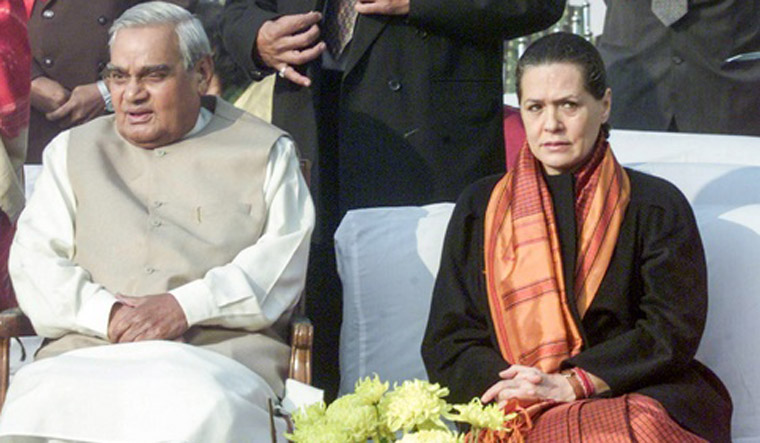It was a conference of opposition parties, meant to convey that they will unitedly take on the BJP and the RSS. However, many of the leaders at the 'Save the Constitution' meet on Thursday fondly remembered former prime minister Atal Bihari Vajpayee in their speeches. Irrespective of Vajpayee's saffron bearings, they invoked him to attack the ideology of the right-wing party and its parent organisation.
This was a clear evidence of the respect that Vajpayee commanded in Indian polity, cutting across party lines. It was not just a simple case of having friends beyond the limits of one's party. He was regarded as one of those rare political leaders who could rise above their parties and their ideologicial foundations to be truly statesmanlike.
Old timers recall that Vajpayee may have been on the opposite side of the ideological divide vis-a-vis the country's first prime minister Jawaharlal Nehru. But the two leaders admired each other greatly. Even as Vajpayee would attack Nehru's policies, the former prime minister would rush to Parliament to listen to him. And Nehru is learnt to have said to Vajpayee that one day he would become prime minister of the country.
In the post-Emergency purge of the Congress, Vajpayee became external affairs minister. When he stepped into his office for the first time, he immediately noted a blank spot, which was earlier adorned by Nehru's portrait. He remarked, “This is where Panditji's portrait used to be” and said to his secretary, “I want it back”.
While Vajpayee's relations with Nehru's daughter—former prime minister Indira Gandhi—were not characterised by the same kind of warmth, he displayed the rare ability to go beyond partisan politics to praise rivals where it was due. After India's victory over Pakistan in the war in 1971, Vajpayee, in Parliament, compared Indira to Goddess Durga.
Rajiv Gandhi, when he was prime minister, is learnt to have gone the extra mile to facilitate Vajpayee's travel to New York so that he could get treated there for a kidney ailment. After Rajiv Gandhi's death, a grieving Vajpayee said, “Today I am in opposition and people expect me to speak like an opponent. But I can't. I only want to talk about what he did for me.”
In an interview, Vajpayee recounted that Rajiv Gandhi, when he came to know about the former's kidney disease, included him in a delegation to the United Nations so that he could travel to New York and stay back for treatment.
Rajiv Gandhi's successor P.V. Narasimha Rao too highly regarded Vajpayee. He made it clear when he chose Vajpayee to head a delegation to Geneva to fight India's case on Kashmir against Pakistan in the United Nations Human Rights Commission, and the Indian side triumphed in the international arena on the highly sensitive issue.
Vajpayee chose the then leader of opposition, Sonia Gandhi, in 2001, to lead an Indian delegation to the US, and this was seen as a step in the evolution of the Congress leader as a politician. The BJP stalwart fondly recalled in a speech he made in New York in 2002 how a concerned Sonia Gandhi had called him when the Parliament was attacked on December 13, 2001, and enquired if he was alright. “Where are you? Are you ok,” Vajpayee had quoted Sonia as having asked him.
Sources close to Congress president Rahul Gandhi say he regrets not having had a chance to interact with Vajpayee. Rahul Gandhi, who was the first leader to visit Vajpayee when he was hospitalised at the AIIMS on June 11, said in his condolence message: “Today India lost a great son....We will miss him.”
Vajpayee had excellent relations even with the leaders of the left parties despite belonging to the opposite ideological pole. A famous story retold is about the former prime minister reaching out to left leaders Harkishan Singh Surjeet and A.B. Bardhan to seek their help in getting out of a sticky situation with regard to the US pressure that India should send troops to Iraq in 2003. Vajpayee invited Surjeet and Bardhan for tea, and the savvy politician quietly conveyed to the two leaders that they raise the pitch of their opposition to the idea so that he could cite that as a reason for deciding not to send troops to Iraq.


